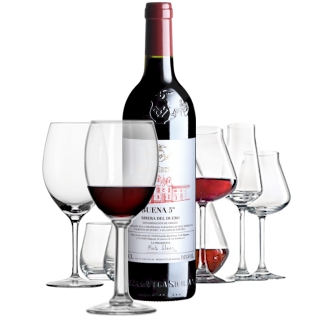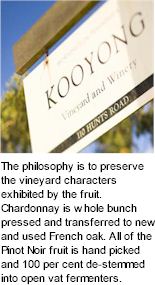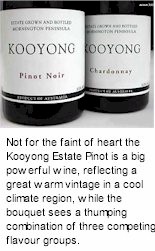


Kooyong Estate was established on a gently undulating 93 hectare property neighbouring Devilbend Reserve, home to many native water birds. The Kooyong name means where the wild fowl gather. The vineyard and winery are part of the Gjergja family domain which also includes Port Phillip Estate. Compared with more southerly vineyards on the Mornington Peninsula, Kooyong experiences a warmer, drier climate, and the light, sandy clay soil is also less vigorous than the more typical rich loam of the region. The winemaker is Sandro Mosele.

Chris and Gail Aytward established Kooyong in 1995 after being Introduced to the wine industry when purchasing a farm at Shoreham on the Mornington Peninsula. The site contained three acres of Chardonnay vines. At this time Mornington was rapidly establishing itself as a premium Pinot Noir and Chardonnay grape-growing region, as both these varieties were suited to Mornington's cool maritime climate. The Aytwards were inspired to develop a second site, specifically selected for its potential to produce top quality fruit, and today wines released under the Kooyong label comes exclusively from this site.
In 1998 plans for a large and modern winery were devised and construction began. Chris Aytward's experience as a property developer with the Grollo brothers helped immensely in the construction of an impressive winery for Kooyong's operations. State of the art equipment was installed to give the winemaking team the best possible opportunity in processing, fermenting and storing top quality wines. Kooyong Estate now lays claim to 52 acres of Pinot Noir and 27 acres of Chardonnay vines. Kooyong strives for complexity in its wines by exercising eight different clones of Pinot and ten clones of Chardonnay.
The Mornington terroir features an undulating ridge system, which receives considerable rainfall throughout the year. The soils vary from rich red clays, to lighter sandy loams depending on location. Kooyong's location was selected specifically to suit production of Pinot Noir and Chardonnay grape varieties. Many vineyards on the Mornington Peninsula struggle with excessive canopy production due to the rich fertile soils. This is often translated in the wine as green or lacking body. The sandy base of Kooyong's terroir helps reduce this vigour. Each clone has its own inherent characteristics which, when skillfully blended together by accomplished winemakers, give wine its many textures and complexity.

Kooyong uses a variety of canopy management techniques to ensure high quality, concentrated grape production. Some of these include shoot thinning and fruit dropping. The Kooyong Estate parcels are situated on the Moorooduc flats of the Mornington Peninsula. The land Is slightly graded facing a north direction. The vineyard has been planted with rows running from South to North, which ensures maximum sunlight exposure. The vines are planted using the vertical shoot position (VSP) trellising system. The vines have been spaced out to reduce shading and increase fruit exposure to sunlight.
Wines are made on site to techniques specifically designed to deal with numerous small batches. The philosophy is to preserve the vineyard characters exhibited by the fruit. Chardonnay is whole bunch pressed and transferred to new and used French oak. Fermentation occurs naturally without yeast additions. All of the Pinot Noir fruit is hand picked and 100 per cent de-stemmed into open vat fermenters. The fruit is chilled to approximately 8-10 degrees and then allowed to warm up ambiently. Spontaneous fermentation occurs about 4-8 days later. The Massale parcels use only 10 per cent to 15 per cent new French oak. The wine is then bottled after approximately 12 months. This shorter maturation period is designed to make this wine more approachable when young. Handpicked Pinot Gris and Viognier is whole bunch pressed and transferred to used French oak. By using only old oak, the Pinot Gris wines receive the benefit of added texture without any oak flavours being imparted.
Kooyong is well equipped with an advanced irrigation system. This allows the winemaking team to administer water to each vine depending on the stress levels expressed by the vines. Kooyong's site receives less rainfall per annum than surrounding vineyards an the Mornington ridge system. The use of an irrigation network enables a high degree of control over the development of both the Pinot Noir and Chardonnay vines.
